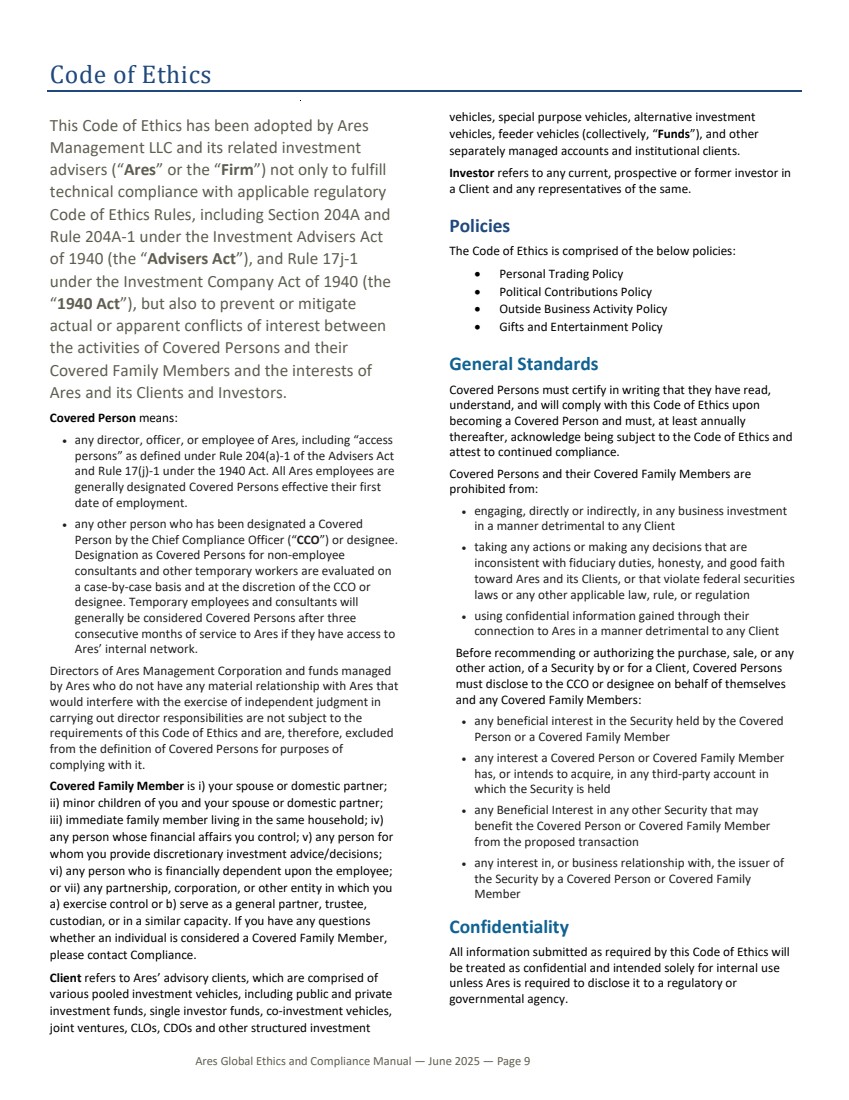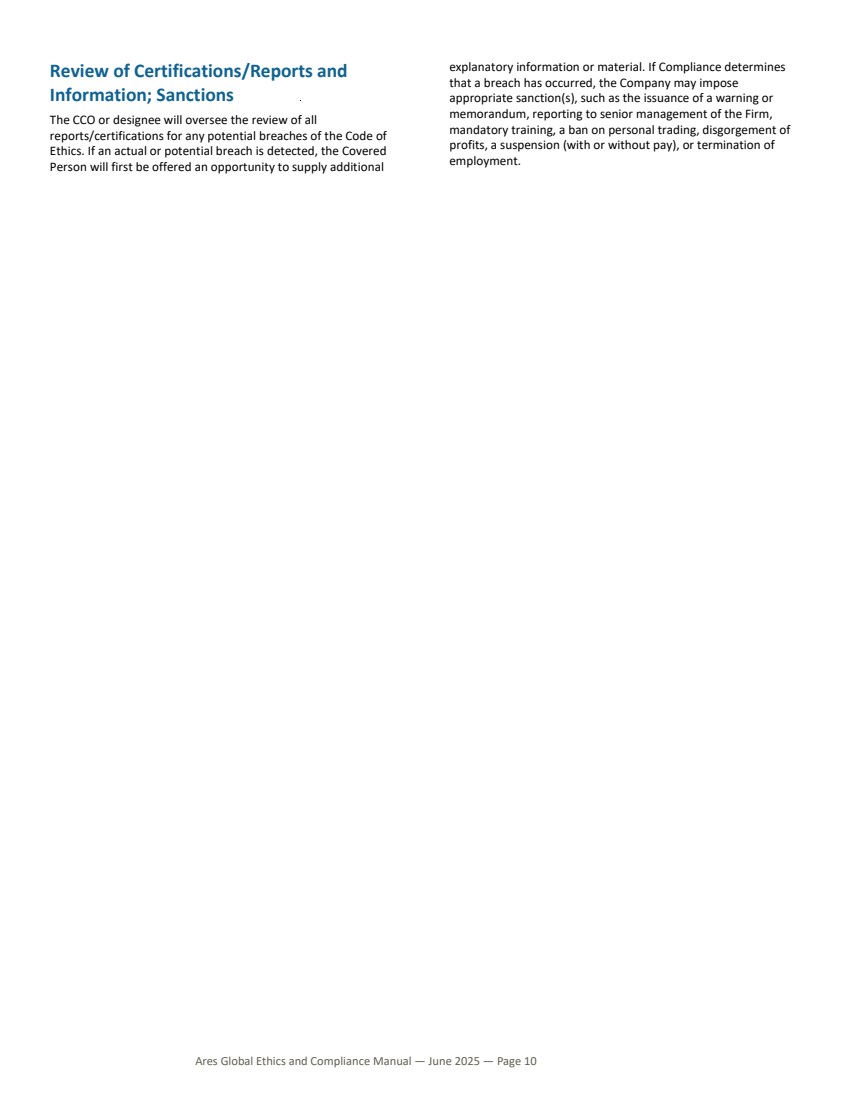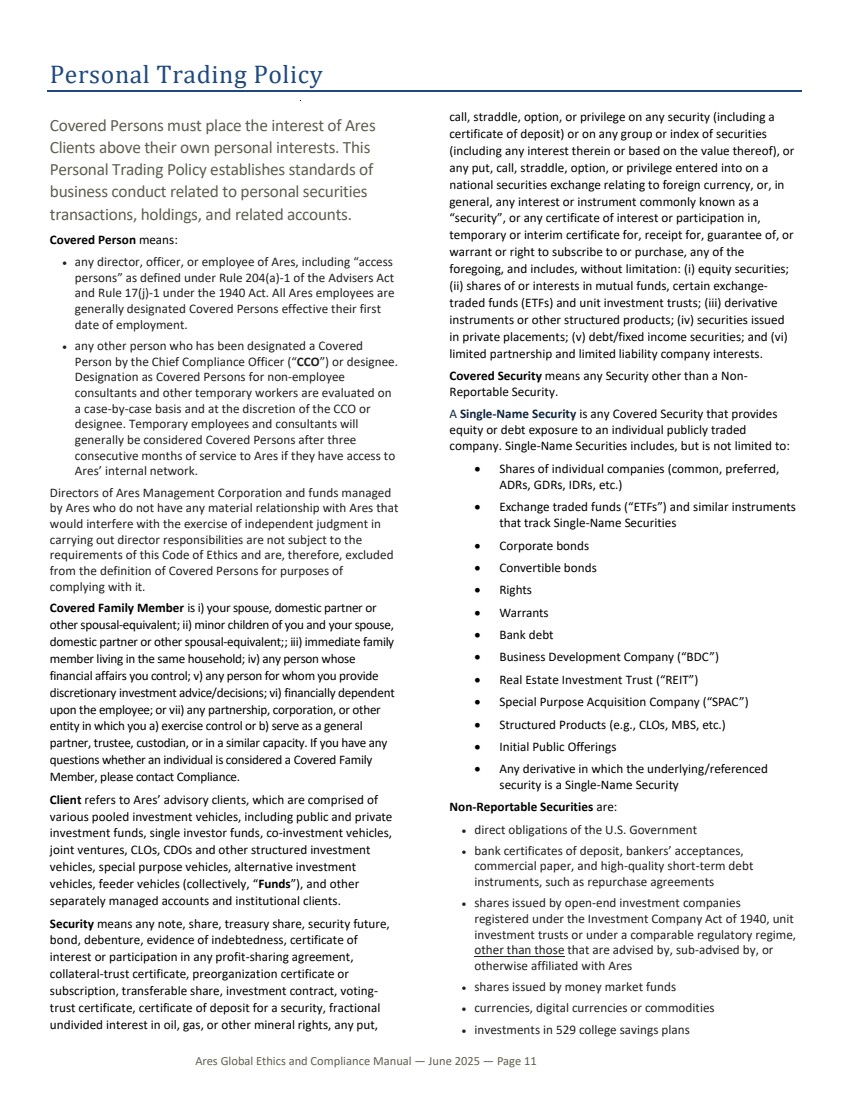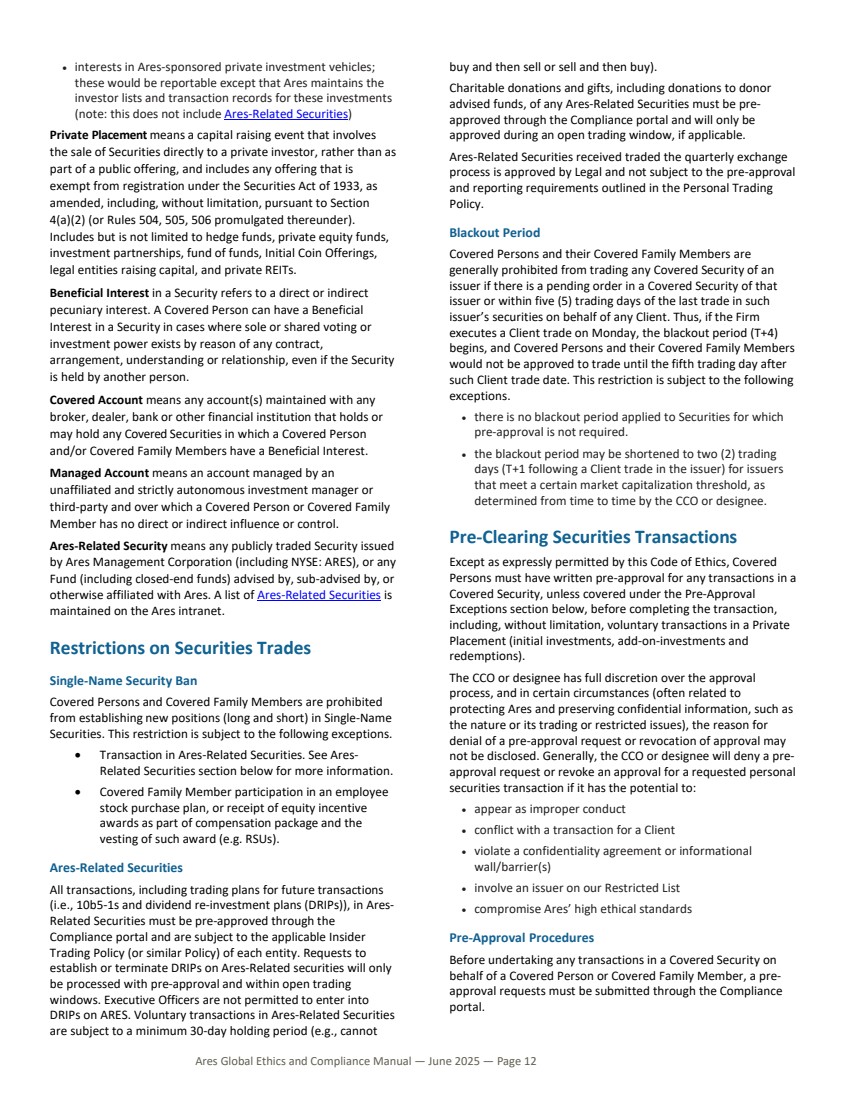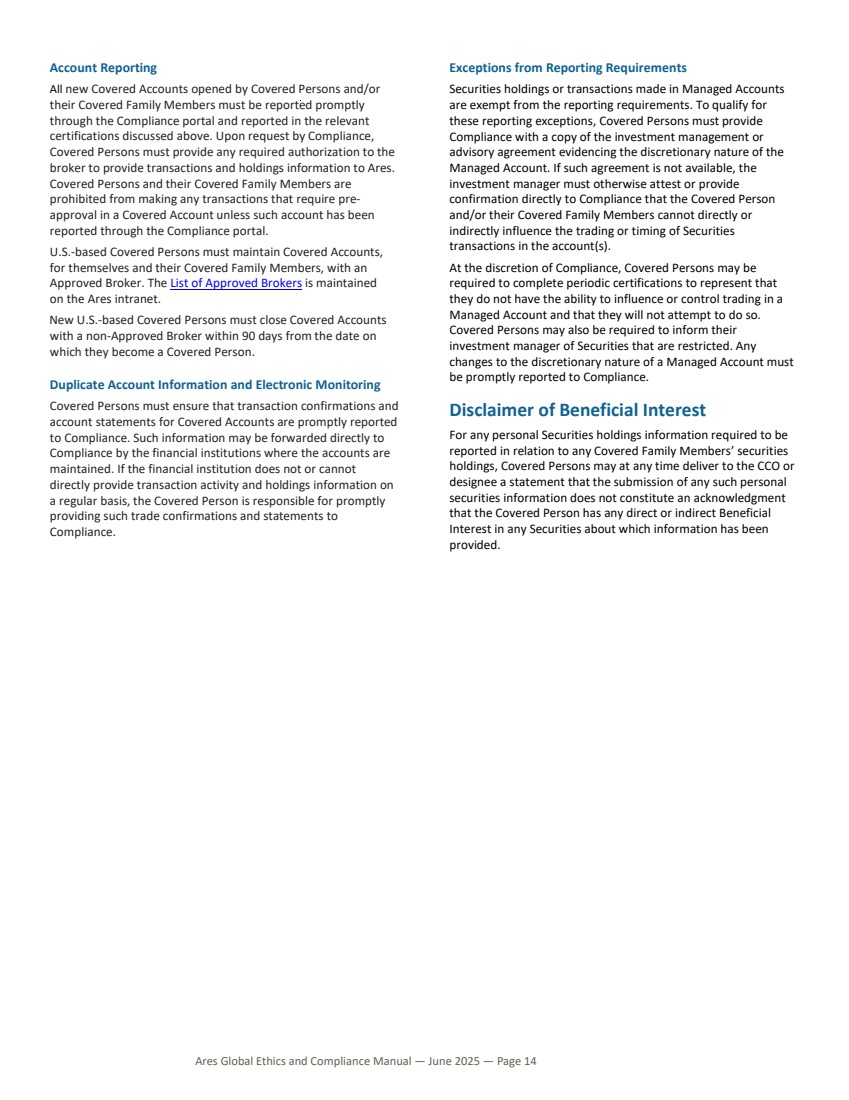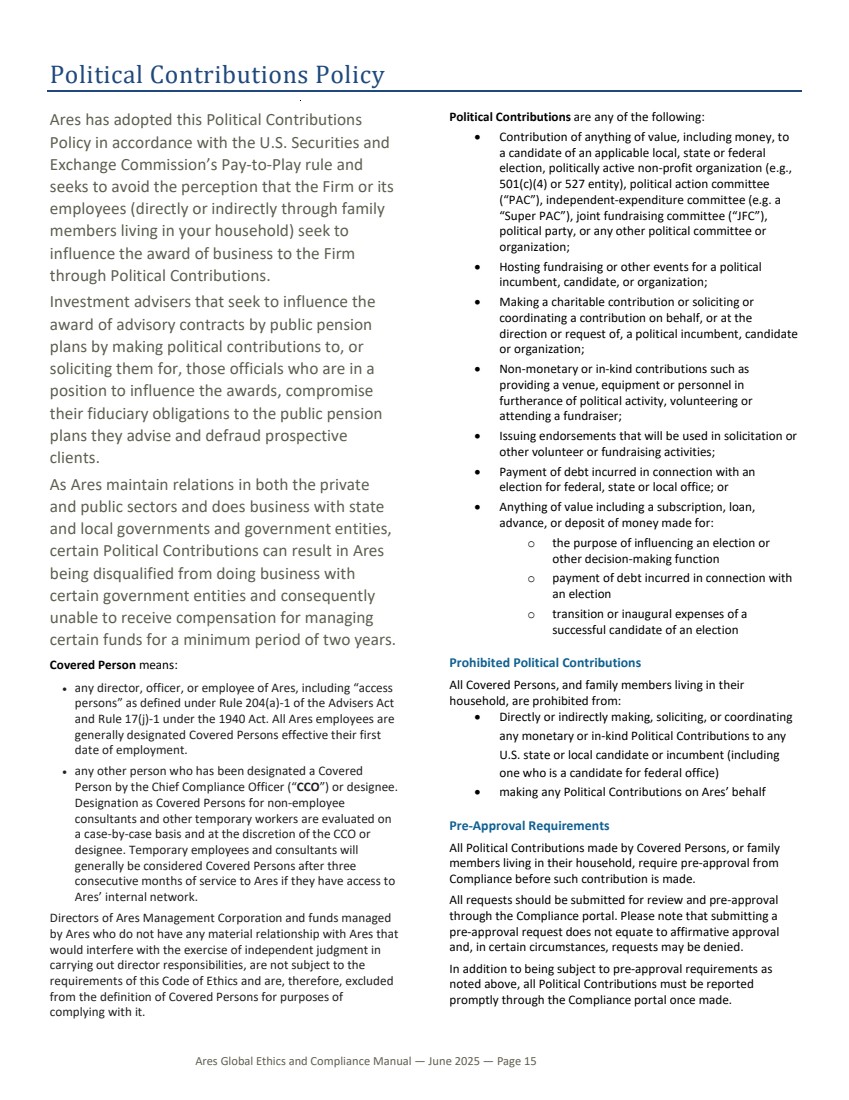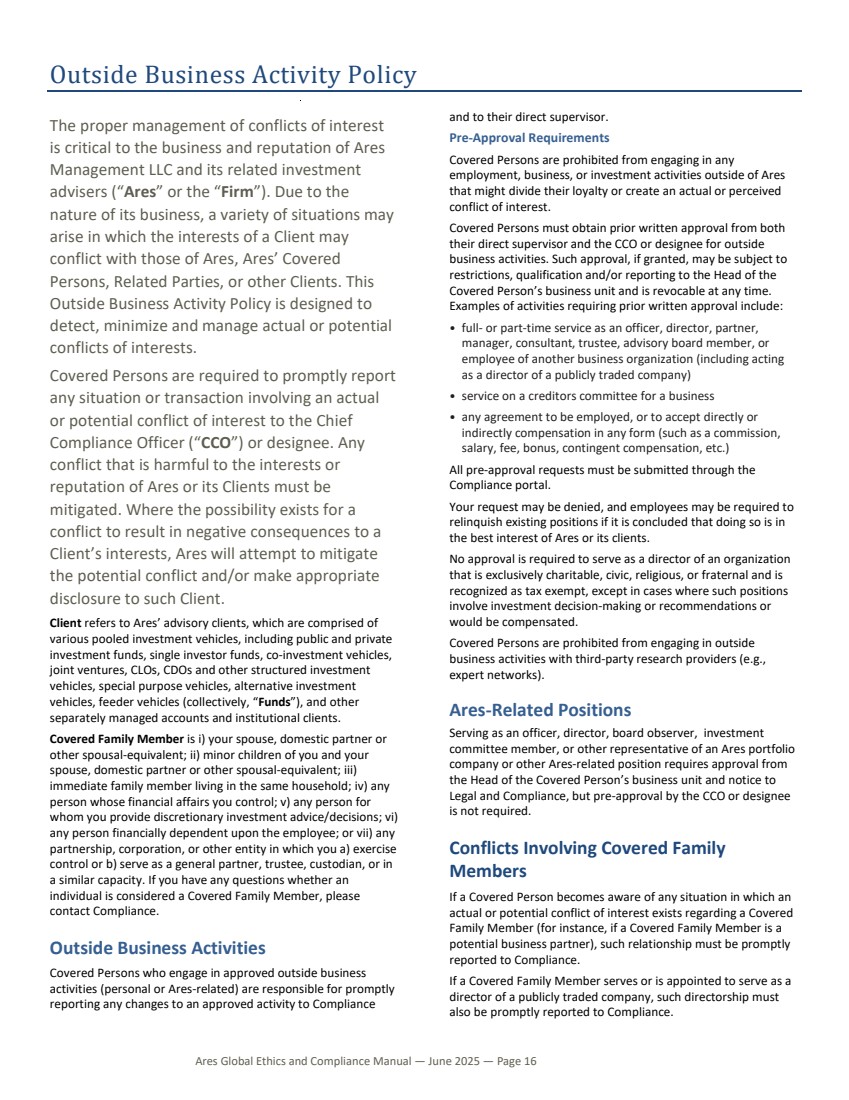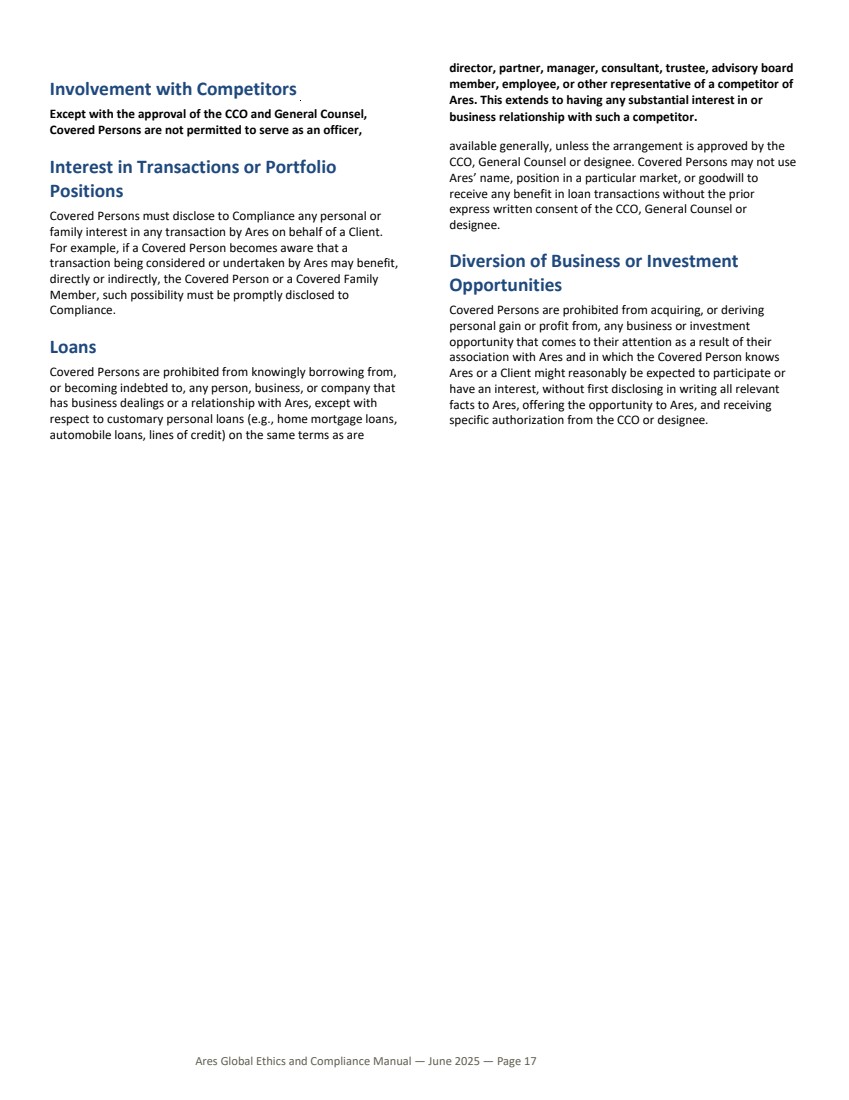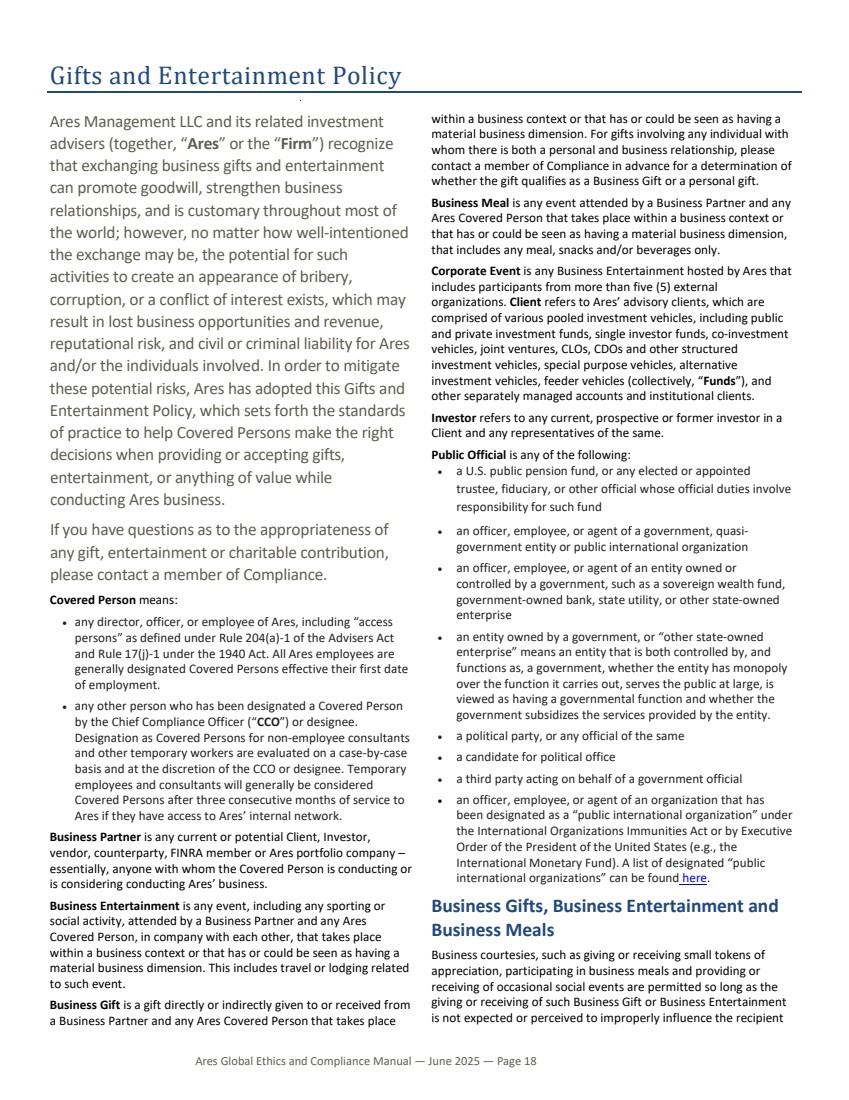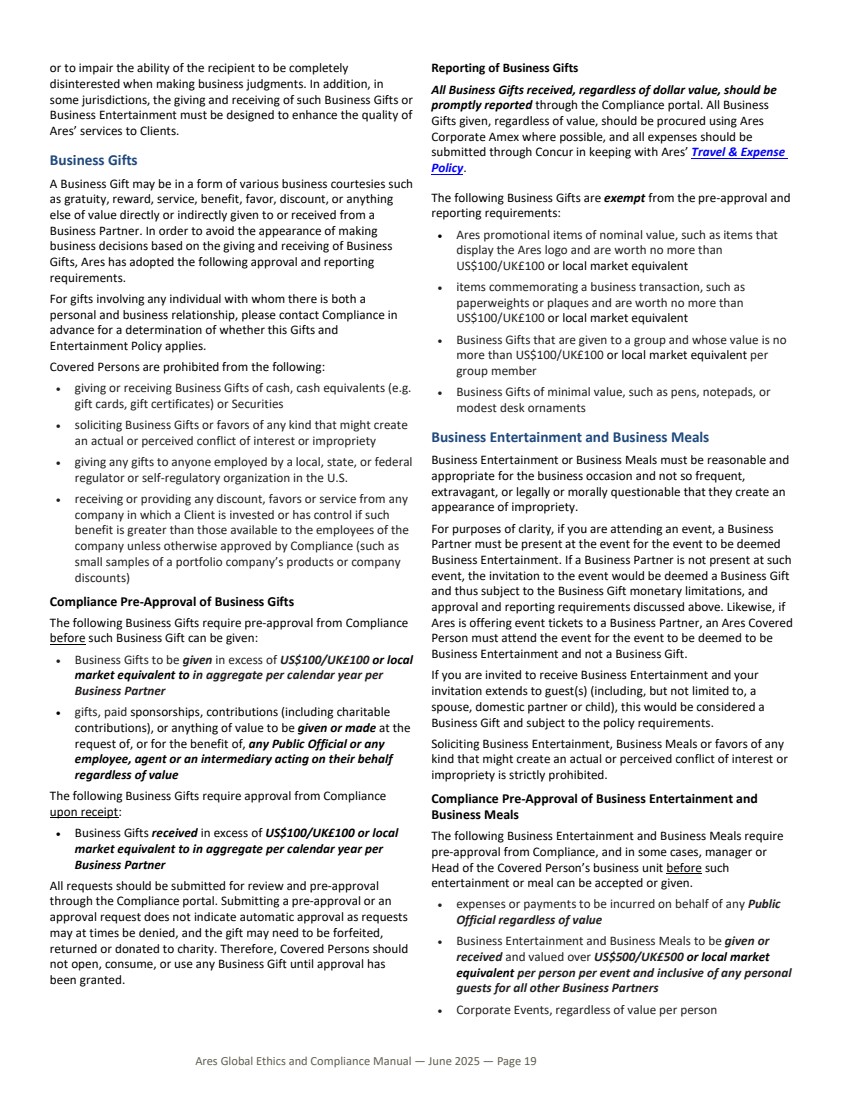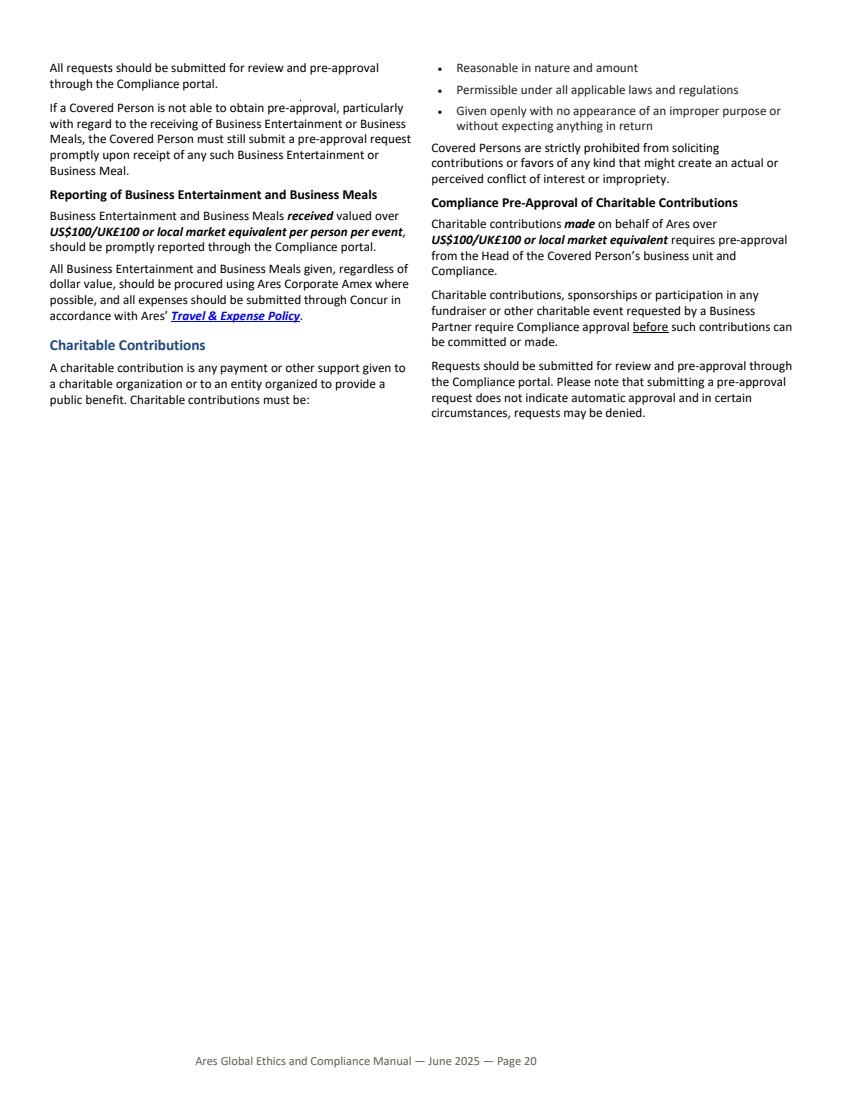| Ares Global Ethics and Compliance Manual — June 2025 — Page 9 Code of Ethics This Code of Ethics has been adopted by Ares Management LLC and its related investment advisers (“Ares” or the “Firm”) not only to fulfill technical compliance with applicable regulatory Code of Ethics Rules, including Section 204A and Rule 204A-1 under the Investment Advisers Act of 1940 (the “Advisers Act”), and Rule 17j-1 under the Investment Company Act of 1940 (the “1940 Act”), but also to prevent or mitigate actual or apparent conflicts of interest between the activities of Covered Persons and their Covered Family Members and the interests of Ares and its Clients and Investors. Covered Person means: • any director, officer, or employee of Ares, including “access persons” as defined under Rule 204(a)-1 of the Advisers Act and Rule 17(j)-1 under the 1940 Act. All Ares employees are generally designated Covered Persons effective their first date of employment. • any other person who has been designated a Covered Person by the Chief Compliance Officer (“CCO”) or designee. Designation as Covered Persons for non-employee consultants and other temporary workers are evaluated on a case-by-case basis and at the discretion of the CCO or designee. Temporary employees and consultants will generally be considered Covered Persons after three consecutive months of service to Ares if they have access to Ares’ internal network. Directors of Ares Management Corporation and funds managed by Ares who do not have any material relationship with Ares that would interfere with the exercise of independent judgment in carrying out director responsibilities are not subject to the requirements of this Code of Ethics and are, therefore, excluded from the definition of Covered Persons for purposes of complying with it. Covered Family Member is i) your spouse or domestic partner; ii) minor children of you and your spouse or domestic partner; iii) immediate family member living in the same household; iv) any person whose financial affairs you control; v) any person for whom you provide discretionary investment advice/decisions; vi) any person who is financially dependent upon the employee; or vii) any partnership, corporation, or other entity in which you a) exercise control or b) serve as a general partner, trustee, custodian, or in a similar capacity. If you have any questions whether an individual is considered a Covered Family Member, please contact Compliance. Client refers to Ares’ advisory clients, which are comprised of various pooled investment vehicles, including public and private investment funds, single investor funds, co-investment vehicles, joint ventures, CLOs, CDOs and other structured investment vehicles, special purpose vehicles, alternative investment vehicles, feeder vehicles (collectively, “Funds”), and other separately managed accounts and institutional clients. Investor refers to any current, prospective or former investor in a Client and any representatives of the same. Policies The Code of Ethics is comprised of the below policies: • Personal Trading Policy • Political Contributions Policy • Outside Business Activity Policy • Gifts and Entertainment Policy General Standards Covered Persons must certify in writing that they have read, understand, and will comply with this Code of Ethics upon becoming a Covered Person and must, at least annually thereafter, acknowledge being subject to the Code of Ethics and attest to continued compliance. Covered Persons and their Covered Family Members are prohibited from: • engaging, directly or indirectly, in any business investment in a manner detrimental to any Client • taking any actions or making any decisions that are inconsistent with fiduciary duties, honesty, and good faith toward Ares and its Clients, or that violate federal securities laws or any other applicable law, rule, or regulation • using confidential information gained through their connection to Ares in a manner detrimental to any Client Before recommending or authorizing the purchase, sale, or any other action, of a Security by or for a Client, Covered Persons must disclose to the CCO or designee on behalf of themselves and any Covered Family Members: • any beneficial interest in the Security held by the Covered Person or a Covered Family Member • any interest a Covered Person or Covered Family Member has, or intends to acquire, in any third-party account in which the Security is held • any Beneficial Interest in any other Security that may benefit the Covered Person or Covered Family Member from the proposed transaction • any interest in, or business relationship with, the issuer of the Security by a Covered Person or Covered Family Member Confidentiality All information submitted as required by this Code of Ethics will be treated as confidential and intended solely for internal use unless Ares is required to disclose it to a regulatory or governmental agency. |
| Ares Global Ethics and Compliance Manual — June 2025 — Page 10 Review of Certifications/Reports and Information; Sanctions The CCO or designee will oversee the review of all reports/certifications for any potential breaches of the Code of Ethics. If an actual or potential breach is detected, the Covered Person will first be offered an opportunity to supply additional explanatory information or material. If Compliance determines that a breach has occurred, the Company may impose appropriate sanction(s), such as the issuance of a warning or memorandum, reporting to senior management of the Firm, mandatory training, a ban on personal trading, disgorgement of profits, a suspension (with or without pay), or termination of employment. |
| Ares Global Ethics and Compliance Manual — June 2025 — Page 11 Personal Trading Policy Covered Persons must place the interest of Ares Clients above their own personal interests. This Personal Trading Policy establishes standards of business conduct related to personal securities transactions, holdings, and related accounts. Covered Person means: • any director, officer, or employee of Ares, including “access persons” as defined under Rule 204(a)-1 of the Advisers Act and Rule 17(j)-1 under the 1940 Act. All Ares employees are generally designated Covered Persons effective their first date of employment. • any other person who has been designated a Covered Person by the Chief Compliance Officer (“CCO”) or designee. Designation as Covered Persons for non-employee consultants and other temporary workers are evaluated on a case-by-case basis and at the discretion of the CCO or designee. Temporary employees and consultants will generally be considered Covered Persons after three consecutive months of service to Ares if they have access to Ares’ internal network. Directors of Ares Management Corporation and funds managed by Ares who do not have any material relationship with Ares that would interfere with the exercise of independent judgment in carrying out director responsibilities are not subject to the requirements of this Code of Ethics and are, therefore, excluded from the definition of Covered Persons for purposes of complying with it. Covered Family Member is i) your spouse, domestic partner or other spousal-equivalent; ii) minor children of you and your spouse, domestic partner or other spousal-equivalent;; iii) immediate family member living in the same household; iv) any person whose financial affairs you control; v) any person for whom you provide discretionary investment advice/decisions; vi) financially dependent upon the employee; or vii) any partnership, corporation, or other entity in which you a) exercise control or b) serve as a general partner, trustee, custodian, or in a similar capacity. If you have any questions whether an individual is considered a Covered Family Member, please contact Compliance. Client refers to Ares’ advisory clients, which are comprised of various pooled investment vehicles, including public and private investment funds, single investor funds, co-investment vehicles, joint ventures, CLOs, CDOs and other structured investment vehicles, special purpose vehicles, alternative investment vehicles, feeder vehicles (collectively, “Funds”), and other separately managed accounts and institutional clients. Security means any note, share, treasury share, security future, bond, debenture, evidence of indebtedness, certificate of interest or participation in any profit-sharing agreement, collateral-trust certificate, preorganization certificate or subscription, transferable share, investment contract, voting-trust certificate, certificate of deposit for a security, fractional undivided interest in oil, gas, or other mineral rights, any put, call, straddle, option, or privilege on any security (including a certificate of deposit) or on any group or index of securities (including any interest therein or based on the value thereof), or any put, call, straddle, option, or privilege entered into on a national securities exchange relating to foreign currency, or, in general, any interest or instrument commonly known as a “security”, or any certificate of interest or participation in, temporary or interim certificate for, receipt for, guarantee of, or warrant or right to subscribe to or purchase, any of the foregoing, and includes, without limitation: (i) equity securities; (ii) shares of or interests in mutual funds, certain exchange-traded funds (ETFs) and unit investment trusts; (iii) derivative instruments or other structured products; (iv) securities issued in private placements; (v) debt/fixed income securities; and (vi) limited partnership and limited liability company interests. Covered Security means any Security other than a Non-Reportable Security. A Single-Name Security is any Covered Security that provides equity or debt exposure to an individual publicly traded company. Single-Name Securities includes, but is not limited to: • Shares of individual companies (common, preferred, ADRs, GDRs, IDRs, etc.) • Exchange traded funds (“ETFs”) and similar instruments that track Single-Name Securities • Corporate bonds • Convertible bonds • Rights • Warrants • Bank debt • Business Development Company (“BDC”) • Real Estate Investment Trust (“REIT”) • Special Purpose Acquisition Company (“SPAC”) • Structured Products (e.g., CLOs, MBS, etc.) • Initial Public Offerings • Any derivative in which the underlying/referenced security is a Single-Name Security Non-Reportable Securities are: • direct obligations of the U.S. Government • bank certificates of deposit, bankers’ acceptances, commercial paper, and high-quality short-term debt instruments, such as repurchase agreements • shares issued by open-end investment companies registered under the Investment Company Act of 1940, unit investment trusts or under a comparable regulatory regime, other than those that are advised by, sub-advised by, or otherwise affiliated with Ares • shares issued by money market funds • currencies, digital currencies or commodities • investments in 529 college savings plans |
| Ares Global Ethics and Compliance Manual — June 2025 — Page 12 • interests in Ares-sponsored private investment vehicles; these would be reportable except that Ares maintains the investor lists and transaction records for these investments (note: this does not include Ares-Related Securities) Private Placement means a capital raising event that involves the sale of Securities directly to a private investor, rather than as part of a public offering, and includes any offering that is exempt from registration under the Securities Act of 1933, as amended, including, without limitation, pursuant to Section 4(a)(2) (or Rules 504, 505, 506 promulgated thereunder). Includes but is not limited to hedge funds, private equity funds, investment partnerships, fund of funds, Initial Coin Offerings, legal entities raising capital, and private REITs. Beneficial Interest in a Security refers to a direct or indirect pecuniary interest. A Covered Person can have a Beneficial Interest in a Security in cases where sole or shared voting or investment power exists by reason of any contract, arrangement, understanding or relationship, even if the Security is held by another person. Covered Account means any account(s) maintained with any broker, dealer, bank or other financial institution that holds or may hold any Covered Securities in which a Covered Person and/or Covered Family Members have a Beneficial Interest. Managed Account means an account managed by an unaffiliated and strictly autonomous investment manager or third-party and over which a Covered Person or Covered Family Member has no direct or indirect influence or control. Ares-Related Security means any publicly traded Security issued by Ares Management Corporation (including NYSE: ARES), or any Fund (including closed-end funds) advised by, sub-advised by, or otherwise affiliated with Ares. A list of Ares-Related Securities is maintained on the Ares intranet. Restrictions on Securities Trades Single-Name Security Ban Covered Persons and Covered Family Members are prohibited from establishing new positions (long and short) in Single-Name Securities. This restriction is subject to the following exceptions. • Transaction in Ares-Related Securities. See Ares-Related Securities section below for more information. • Covered Family Member participation in an employee stock purchase plan, or receipt of equity incentive awards as part of compensation package and the vesting of such award (e.g. RSUs). Ares-Related Securities All transactions, including trading plans for future transactions (i.e., 10b5-1s and dividend re-investment plans (DRIPs)), in Ares-Related Securities must be pre-approved through the Compliance portal and are subject to the applicable Insider Trading Policy (or similar Policy) of each entity. Requests to establish or terminate DRIPs on Ares-Related securities will only be processed with pre-approval and within open trading windows. Executive Officers are not permitted to enter into DRIPs on ARES. Voluntary transactions in Ares-Related Securities are subject to a minimum 30-day holding period (e.g., cannot buy and then sell or sell and then buy). Charitable donations and gifts, including donations to donor advised funds, of any Ares-Related Securities must be pre-approved through the Compliance portal and will only be approved during an open trading window, if applicable. Ares-Related Securities received traded the quarterly exchange process is approved by Legal and not subject to the pre-approval and reporting requirements outlined in the Personal Trading Policy. Blackout Period Covered Persons and their Covered Family Members are generally prohibited from trading any Covered Security of an issuer if there is a pending order in a Covered Security of that issuer or within five (5) trading days of the last trade in such issuer’s securities on behalf of any Client. Thus, if the Firm executes a Client trade on Monday, the blackout period (T+4) begins, and Covered Persons and their Covered Family Members would not be approved to trade until the fifth trading day after such Client trade date. This restriction is subject to the following exceptions. • there is no blackout period applied to Securities for which pre-approval is not required. • the blackout period may be shortened to two (2) trading days (T+1 following a Client trade in the issuer) for issuers that meet a certain market capitalization threshold, as determined from time to time by the CCO or designee. Pre-Clearing Securities Transactions Except as expressly permitted by this Code of Ethics, Covered Persons must have written pre-approval for any transactions in a Covered Security, unless covered under the Pre-Approval Exceptions section below, before completing the transaction, including, without limitation, voluntary transactions in a Private Placement (initial investments, add-on-investments and redemptions). The CCO or designee has full discretion over the approval process, and in certain circumstances (often related to protecting Ares and preserving confidential information, such as the nature or its trading or restricted issues), the reason for denial of a pre-approval request or revocation of approval may not be disclosed. Generally, the CCO or designee will deny a pre-approval request or revoke an approval for a requested personal securities transaction if it has the potential to: • appear as improper conduct • conflict with a transaction for a Client • violate a confidentiality agreement or informational wall/barrier(s) • involve an issuer on our Restricted List • compromise Ares’ high ethical standards Pre-Approval Procedures Before undertaking any transactions in a Covered Security on behalf of a Covered Person or Covered Family Member, a pre-approval requests must be submitted through the Compliance portal. |
| Ares Global Ethics and Compliance Manual — June 2025 — Page 13 Approval Window Pre-approval for a transaction is generally valid for two (2) business days following the date of approval, meaning it expires at the end of the second trading day after the day it was approved. The only exceptions are Private Placements (for which approvals are valid until the closing of the offering) and any other exceptions specified by the CCO or designee. If pre-approval expires prior to the execution of a transaction, a new pre-approval request must be submitted through the Compliance portal prior to the next execution. “Limit,” “stop-loss,” “good-until-cancelled,” or “standing” orders must be fully executed before the pre-approval expires or a new pre-approval request must be submitted and approved for continued execution of such orders. Pre-Approval Exceptions Pre-approval is not required for any of the following but transactions are still reportable: • exchange-traded funds (“ETFs”) or exchange traded notes (“ETNs”), excluding Single-Name Securities, for which the underlying performance is based on a particular market index or a portfolio of assets, and in publicly traded closed-end funds (“CEFs”), except for any Ares-Related Security • municipal Securities or auction rate preferred Securities (“ARPS”) • sovereign debt Securities • Securities over which a Covered Person or Covered Family Member has no direct or indirect influence or control (such as transactions in a Managed Account) • automatic investment plan, automatic rebalancing plan, dividend reinvestment plan, or other program with a predetermined schedule and allocation, provided either that the program is generally available to shareholders or investors in the issuer or that the initial investment in a Security through the plan is approved in advance by Compliance • acquisitions of Securities through stock dividends, dividend reinvestments, stock splits, reverse stock splits, mergers, consolidations, spin-offs, and other similar corporate reorganizations or distributions generally applicable to all holders of the same class of Securities • other non-volitional events (e.g., exercise or assignment of an option contract at expiration (as opposed to the exercise or closing of an option contract prior to expiration, which requires pre-approval) or sales of involuntary factional shares related to an account transfer/ACAT) • automatic acquisition or disposition of an employer’s Securities through the employer’s 401(k) plan, employee stock purchase plan, personal pension plan, ISA or other similar program • purchases resulting from an exercise of rights issued pro rata to all holders of a class of Securities, to the extent these rights were acquired from the issuer, and the sales of such rights • the exercise of a conversion or redemption right, or similar transactions with the issuer of a Security under the terms of the Security • sales conducted in an investment account specifically designated for charitable giving (i.e., where proceeds from sales of securities transferred to the account are donated to various charitable organizations) of which the Covered Person has no discretionary authority Gifting Securities Gifts of Covered Securities must properly be pre-approved, as applicable, and reported in the Compliance Portal. Giving: The gifting (including donations to donor advised funds/charitable giving accounts and donations to non-profits) of a Covered Security by you or your Covered Family Member is considered a sale transaction. As such, the pre-approval and disclosure requirements outlined in this policy apply. Once pre-approval is received, the gift must be initiated within the approval window. Receiving: Pre-approval is not required for the receipt of Covered Securities as long as the donor is not an Ares business partner and the Security was selected at the full discretion of the donor. Certifications and Reporting Covered Persons must submit various certifications and reports through the Compliance portal or as otherwise directed by Compliance. These certifications and reports must also include Covered Family Members’ information. Initial Certifications Covered Persons must complete and submit an Initial Disclosure Certification within ten (10) calendar days of being deemed a Covered Person. The certification requires, among other things, disclosure of certain Covered Account and Covered Securities holdings. The Covered Accounts and Covered Securities information reported in this certification must be dated within 45 days prior to the Covered Person being deemed a Covered Person. Failure to submit these certifications by the stated deadline will result in a prohibition from engaging in any personal securities transactions that require pre-approval until the certifications are submitted. Other sanctions may be applied as well. Quarterly Certifications Within 30 days of the end of each calendar quarter, unless on a leave of absence or other exception granted by the CCO or designee, Covered Persons must complete and submit a Quarterly Transaction Certification and a Quarterly Covered Account Certification. The Quarterly Transaction Certification requires disclosure of all Covered Securities transactions made by Covered Persons or their Covered Family Members during the quarter. Compliance may require additional certifications. Annual Holdings Report Within 30 days of each calendar year end, Covered Persons must complete an Annual Certification to report all Covered Securities held by them or their Covered Family Members as of the end of such calendar year. Covered Securities held in Managed Accounts are exempt from this reporting requirement. |
| Ares Global Ethics and Compliance Manual — June 2025 — Page 14 Account Reporting All new Covered Accounts opened by Covered Persons and/or their Covered Family Members must be reported promptly through the Compliance portal and reported in the relevant certifications discussed above. Upon request by Compliance, Covered Persons must provide any required authorization to the broker to provide transactions and holdings information to Ares. Covered Persons and their Covered Family Members are prohibited from making any transactions that require pre-approval in a Covered Account unless such account has been reported through the Compliance portal. U.S.-based Covered Persons must maintain Covered Accounts, for themselves and their Covered Family Members, with an Approved Broker. The List of Approved Brokers is maintained on the Ares intranet. New U.S.-based Covered Persons must close Covered Accounts with a non-Approved Broker within 90 days from the date on which they become a Covered Person. Duplicate Account Information and Electronic Monitoring Covered Persons must ensure that transaction confirmations and account statements for Covered Accounts are promptly reported to Compliance. Such information may be forwarded directly to Compliance by the financial institutions where the accounts are maintained. If the financial institution does not or cannot directly provide transaction activity and holdings information on a regular basis, the Covered Person is responsible for promptly providing such trade confirmations and statements to Compliance. Exceptions from Reporting Requirements Securities holdings or transactions made in Managed Accounts are exempt from the reporting requirements. To qualify for these reporting exceptions, Covered Persons must provide Compliance with a copy of the investment management or advisory agreement evidencing the discretionary nature of the Managed Account. If such agreement is not available, the investment manager must otherwise attest or provide confirmation directly to Compliance that the Covered Person and/or their Covered Family Members cannot directly or indirectly influence the trading or timing of Securities transactions in the account(s). At the discretion of Compliance, Covered Persons may be required to complete periodic certifications to represent that they do not have the ability to influence or control trading in a Managed Account and that they will not attempt to do so. Covered Persons may also be required to inform their investment manager of Securities that are restricted. Any changes to the discretionary nature of a Managed Account must be promptly reported to Compliance. Disclaimer of Beneficial Interest For any personal Securities holdings information required to be reported in relation to any Covered Family Members’ securities holdings, Covered Persons may at any time deliver to the CCO or designee a statement that the submission of any such personal securities information does not constitute an acknowledgment that the Covered Person has any direct or indirect Beneficial Interest in any Securities about which information has been provided. |
| Ares Global Ethics and Compliance Manual — June 2025 — Page 15 Political Contributions Policy Ares has adopted this Political Contributions Policy in accordance with the U.S. Securities and Exchange Commission’s Pay-to-Play rule and seeks to avoid the perception that the Firm or its employees (directly or indirectly through family members living in your household) seek to influence the award of business to the Firm through Political Contributions. Investment advisers that seek to influence the award of advisory contracts by public pension plans by making political contributions to, or soliciting them for, those officials who are in a position to influence the awards, compromise their fiduciary obligations to the public pension plans they advise and defraud prospective clients. As Ares maintain relations in both the private and public sectors and does business with state and local governments and government entities, certain Political Contributions can result in Ares being disqualified from doing business with certain government entities and consequently unable to receive compensation for managing certain funds for a minimum period of two years. Covered Person means: • any director, officer, or employee of Ares, including “access persons” as defined under Rule 204(a)-1 of the Advisers Act and Rule 17(j)-1 under the 1940 Act. All Ares employees are generally designated Covered Persons effective their first date of employment. • any other person who has been designated a Covered Person by the Chief Compliance Officer (“CCO”) or designee. Designation as Covered Persons for non-employee consultants and other temporary workers are evaluated on a case-by-case basis and at the discretion of the CCO or designee. Temporary employees and consultants will generally be considered Covered Persons after three consecutive months of service to Ares if they have access to Ares’ internal network. Directors of Ares Management Corporation and funds managed by Ares who do not have any material relationship with Ares that would interfere with the exercise of independent judgment in carrying out director responsibilities, are not subject to the requirements of this Code of Ethics and are, therefore, excluded from the definition of Covered Persons for purposes of complying with it. Political Contributions are any of the following: • Contribution of anything of value, including money, to a candidate of an applicable local, state or federal election, politically active non-profit organization (e.g., 501(c)(4) or 527 entity), political action committee (“PAC”), independent-expenditure committee (e.g. a “Super PAC”), joint fundraising committee (“JFC”), political party, or any other political committee or organization; • Hosting fundraising or other events for a political incumbent, candidate, or organization; • Making a charitable contribution or soliciting or coordinating a contribution on behalf, or at the direction or request of, a political incumbent, candidate or organization; • Non-monetary or in-kind contributions such as providing a venue, equipment or personnel in furtherance of political activity, volunteering or attending a fundraiser; • Issuing endorsements that will be used in solicitation or other volunteer or fundraising activities; • Payment of debt incurred in connection with an election for federal, state or local office; or • Anything of value including a subscription, loan, advance, or deposit of money made for: o the purpose of influencing an election or other decision-making function o payment of debt incurred in connection with an election o transition or inaugural expenses of a successful candidate of an election Prohibited Political Contributions All Covered Persons, and family members living in their household, are prohibited from: • Directly or indirectly making, soliciting, or coordinating any monetary or in-kind Political Contributions to any U.S. state or local candidate or incumbent (including one who is a candidate for federal office) • making any Political Contributions on Ares’ behalf Pre-Approval Requirements All Political Contributions made by Covered Persons, or family members living in their household, require pre-approval from Compliance before such contribution is made. All requests should be submitted for review and pre-approval through the Compliance portal. Please note that submitting a pre-approval request does not equate to affirmative approval and, in certain circumstances, requests may be denied. In addition to being subject to pre-approval requirements as noted above, all Political Contributions must be reported promptly through the Compliance portal once made. |
| Ares Global Ethics and Compliance Manual — June 2025 — Page 16 Outside Business Activity Policy The proper management of conflicts of interest is critical to the business and reputation of Ares Management LLC and its related investment advisers (“Ares” or the “Firm”). Due to the nature of its business, a variety of situations may arise in which the interests of a Client may conflict with those of Ares, Ares’ Covered Persons, Related Parties, or other Clients. This Outside Business Activity Policy is designed to detect, minimize and manage actual or potential conflicts of interests. Covered Persons are required to promptly report any situation or transaction involving an actual or potential conflict of interest to the Chief Compliance Officer (“CCO”) or designee. Any conflict that is harmful to the interests or reputation of Ares or its Clients must be mitigated. Where the possibility exists for a conflict to result in negative consequences to a Client’s interests, Ares will attempt to mitigate the potential conflict and/or make appropriate disclosure to such Client. Client refers to Ares’ advisory clients, which are comprised of various pooled investment vehicles, including public and private investment funds, single investor funds, co-investment vehicles, joint ventures, CLOs, CDOs and other structured investment vehicles, special purpose vehicles, alternative investment vehicles, feeder vehicles (collectively, “Funds”), and other separately managed accounts and institutional clients. Covered Family Member is i) your spouse, domestic partner or other spousal-equivalent; ii) minor children of you and your spouse, domestic partner or other spousal-equivalent; iii) immediate family member living in the same household; iv) any person whose financial affairs you control; v) any person for whom you provide discretionary investment advice/decisions; vi) any person financially dependent upon the employee; or vii) any partnership, corporation, or other entity in which you a) exercise control or b) serve as a general partner, trustee, custodian, or in a similar capacity. If you have any questions whether an individual is considered a Covered Family Member, please contact Compliance. Outside Business Activities Covered Persons who engage in approved outside business activities (personal or Ares-related) are responsible for promptly reporting any changes to an approved activity to Compliance and to their direct supervisor. Pre-Approval Requirements Covered Persons are prohibited from engaging in any employment, business, or investment activities outside of Ares that might divide their loyalty or create an actual or perceived conflict of interest. Covered Persons must obtain prior written approval from both their direct supervisor and the CCO or designee for outside business activities. Such approval, if granted, may be subject to restrictions, qualification and/or reporting to the Head of the Covered Person’s business unit and is revocable at any time. Examples of activities requiring prior written approval include: • full- or part-time service as an officer, director, partner, manager, consultant, trustee, advisory board member, or employee of another business organization (including acting as a director of a publicly traded company) • service on a creditors committee for a business • any agreement to be employed, or to accept directly or indirectly compensation in any form (such as a commission, salary, fee, bonus, contingent compensation, etc.) All pre-approval requests must be submitted through the Compliance portal. Your request may be denied, and employees may be required to relinquish existing positions if it is concluded that doing so is in the best interest of Ares or its clients. No approval is required to serve as a director of an organization that is exclusively charitable, civic, religious, or fraternal and is recognized as tax exempt, except in cases where such positions involve investment decision-making or recommendations or would be compensated. Covered Persons are prohibited from engaging in outside business activities with third-party research providers (e.g., expert networks). Ares-Related Positions Serving as an officer, director, board observer, investment committee member, or other representative of an Ares portfolio company or other Ares-related position requires approval from the Head of the Covered Person’s business unit and notice to Legal and Compliance, but pre-approval by the CCO or designee is not required. Conflicts Involving Covered Family Members If a Covered Person becomes aware of any situation in which an actual or potential conflict of interest exists regarding a Covered Family Member (for instance, if a Covered Family Member is a potential business partner), such relationship must be promptly reported to Compliance. If a Covered Family Member serves or is appointed to serve as a director of a publicly traded company, such directorship must also be promptly reported to Compliance. |
| Ares Global Ethics and Compliance Manual — June 2025 — Page 17 Involvement with Competitors Except with the approval of the CCO and General Counsel, Covered Persons are not permitted to serve as an officer, director, partner, manager, consultant, trustee, advisory board member, employee, or other representative of a competitor of Ares. This extends to having any substantial interest in or business relationship with such a competitor. Interest in Transactions or Portfolio Positions Covered Persons must disclose to Compliance any personal or family interest in any transaction by Ares on behalf of a Client. For example, if a Covered Person becomes aware that a transaction being considered or undertaken by Ares may benefit, directly or indirectly, the Covered Person or a Covered Family Member, such possibility must be promptly disclosed to Compliance. Loans Covered Persons are prohibited from knowingly borrowing from, or becoming indebted to, any person, business, or company that has business dealings or a relationship with Ares, except with respect to customary personal loans (e.g., home mortgage loans, automobile loans, lines of credit) on the same terms as are available generally, unless the arrangement is approved by the CCO, General Counsel or designee. Covered Persons may not use Ares’ name, position in a particular market, or goodwill to receive any benefit in loan transactions without the prior express written consent of the CCO, General Counsel or designee. Diversion of Business or Investment Opportunities Covered Persons are prohibited from acquiring, or deriving personal gain or profit from, any business or investment opportunity that comes to their attention as a result of their association with Ares and in which the Covered Person knows Ares or a Client might reasonably be expected to participate or have an interest, without first disclosing in writing all relevant facts to Ares, offering the opportunity to Ares, and receiving specific authorization from the CCO or designee. |
| Ares Global Ethics and Compliance Manual — June 2025 — Page 18 Gifts and Entertainment Policy Ares Management LLC and its related investment advisers (together, “Ares” or the “Firm”) recognize that exchanging business gifts and entertainment can promote goodwill, strengthen business relationships, and is customary throughout most of the world; however, no matter how well-intentioned the exchange may be, the potential for such activities to create an appearance of bribery, corruption, or a conflict of interest exists, which may result in lost business opportunities and revenue, reputational risk, and civil or criminal liability for Ares and/or the individuals involved. In order to mitigate these potential risks, Ares has adopted this Gifts and Entertainment Policy, which sets forth the standards of practice to help Covered Persons make the right decisions when providing or accepting gifts, entertainment, or anything of value while conducting Ares business. If you have questions as to the appropriateness of any gift, entertainment or charitable contribution, please contact a member of Compliance. Covered Person means: • any director, officer, or employee of Ares, including “access persons” as defined under Rule 204(a)-1 of the Advisers Act and Rule 17(j)-1 under the 1940 Act. All Ares employees are generally designated Covered Persons effective their first date of employment. • any other person who has been designated a Covered Person by the Chief Compliance Officer (“CCO”) or designee. Designation as Covered Persons for non-employee consultants and other temporary workers are evaluated on a case-by-case basis and at the discretion of the CCO or designee. Temporary employees and consultants will generally be considered Covered Persons after three consecutive months of service to Ares if they have access to Ares’ internal network. Business Partner is any current or potential Client, Investor, vendor, counterparty, FINRA member or Ares portfolio company – essentially, anyone with whom the Covered Person is conducting or is considering conducting Ares’ business. Business Entertainment is any event, including any sporting or social activity, attended by a Business Partner and any Ares Covered Person, in company with each other, that takes place within a business context or that has or could be seen as having a material business dimension. This includes travel or lodging related to such event. Business Gift is a gift directly or indirectly given to or received from a Business Partner and any Ares Covered Person that takes place within a business context or that has or could be seen as having a material business dimension. For gifts involving any individual with whom there is both a personal and business relationship, please contact a member of Compliance in advance for a determination of whether the gift qualifies as a Business Gift or a personal gift. Business Meal is any event attended by a Business Partner and any Ares Covered Person that takes place within a business context or that has or could be seen as having a material business dimension, that includes any meal, snacks and/or beverages only. Corporate Event is any Business Entertainment hosted by Ares that includes participants from more than five (5) external organizations. Client refers to Ares’ advisory clients, which are comprised of various pooled investment vehicles, including public and private investment funds, single investor funds, co-investment vehicles, joint ventures, CLOs, CDOs and other structured investment vehicles, special purpose vehicles, alternative investment vehicles, feeder vehicles (collectively, “Funds”), and other separately managed accounts and institutional clients. Investor refers to any current, prospective or former investor in a Client and any representatives of the same. Public Official is any of the following: • a U.S. public pension fund, or any elected or appointed trustee, fiduciary, or other official whose official duties involve responsibility for such fund • an officer, employee, or agent of a government, quasi-government entity or public international organization • an officer, employee, or agent of an entity owned or controlled by a government, such as a sovereign wealth fund, government-owned bank, state utility, or other state-owned enterprise • an entity owned by a government, or “other state-owned enterprise” means an entity that is both controlled by, and functions as, a government, whether the entity has monopoly over the function it carries out, serves the public at large, is viewed as having a governmental function and whether the government subsidizes the services provided by the entity. • a political party, or any official of the same • a candidate for political office • a third party acting on behalf of a government official • an officer, employee, or agent of an organization that has been designated as a “public international organization” under the International Organizations Immunities Act or by Executive Order of the President of the United States (e.g., the International Monetary Fund). A list of designated “public international organizations” can be found here. Business Gifts, Business Entertainment and Business Meals Business courtesies, such as giving or receiving small tokens of appreciation, participating in business meals and providing or receiving of occasional social events are permitted so long as the giving or receiving of such Business Gift or Business Entertainment is not expected or perceived to improperly influence the recipient |
| Ares Global Ethics and Compliance Manual — June 2025 — Page 19 or to impair the ability of the recipient to be completely disinterested when making business judgments. In addition, in some jurisdictions, the giving and receiving of such Business Gifts or Business Entertainment must be designed to enhance the quality of Ares’ services to Clients. Business Gifts A Business Gift may be in a form of various business courtesies such as gratuity, reward, service, benefit, favor, discount, or anything else of value directly or indirectly given to or received from a Business Partner. In order to avoid the appearance of making business decisions based on the giving and receiving of Business Gifts, Ares has adopted the following approval and reporting requirements. For gifts involving any individual with whom there is both a personal and business relationship, please contact Compliance in advance for a determination of whether this Gifts and Entertainment Policy applies. Covered Persons are prohibited from the following: • giving or receiving Business Gifts of cash, cash equivalents (e.g. gift cards, gift certificates) or Securities • soliciting Business Gifts or favors of any kind that might create an actual or perceived conflict of interest or impropriety • giving any gifts to anyone employed by a local, state, or federal regulator or self-regulatory organization in the U.S. • receiving or providing any discount, favors or service from any company in which a Client is invested or has control if such benefit is greater than those available to the employees of the company unless otherwise approved by Compliance (such as small samples of a portfolio company’s products or company discounts) Compliance Pre-Approval of Business Gifts The following Business Gifts require pre-approval from Compliance before such Business Gift can be given: • Business Gifts to be given in excess of US$100/UK£100 or local market equivalent to in aggregate per calendar year per Business Partner • gifts, paid sponsorships, contributions (including charitable contributions), or anything of value to be given or made at the request of, or for the benefit of, any Public Official or any employee, agent or an intermediary acting on their behalf regardless of value The following Business Gifts require approval from Compliance upon receipt: • Business Gifts received in excess of US$100/UK£100 or local market equivalent to in aggregate per calendar year per Business Partner All requests should be submitted for review and pre-approval through the Compliance portal. Submitting a pre-approval or an approval request does not indicate automatic approval as requests may at times be denied, and the gift may need to be forfeited, returned or donated to charity. Therefore, Covered Persons should not open, consume, or use any Business Gift until approval has been granted. Reporting of Business Gifts All Business Gifts received, regardless of dollar value, should be promptly reported through the Compliance portal. All Business Gifts given, regardless of value, should be procured using Ares Corporate Amex where possible, and all expenses should be submitted through Concur in keeping with Ares’ Travel & Expense Policy. The following Business Gifts are exempt from the pre-approval and reporting requirements: • Ares promotional items of nominal value, such as items that display the Ares logo and are worth no more than US$100/UK£100 or local market equivalent • items commemorating a business transaction, such as paperweights or plaques and are worth no more than US$100/UK£100 or local market equivalent • Business Gifts that are given to a group and whose value is no more than US$100/UK£100 or local market equivalent per group member • Business Gifts of minimal value, such as pens, notepads, or modest desk ornaments Business Entertainment and Business Meals Business Entertainment or Business Meals must be reasonable and appropriate for the business occasion and not so frequent, extravagant, or legally or morally questionable that they create an appearance of impropriety. For purposes of clarity, if you are attending an event, a Business Partner must be present at the event for the event to be deemed Business Entertainment. If a Business Partner is not present at such event, the invitation to the event would be deemed a Business Gift and thus subject to the Business Gift monetary limitations, and approval and reporting requirements discussed above. Likewise, if Ares is offering event tickets to a Business Partner, an Ares Covered Person must attend the event for the event to be deemed to be Business Entertainment and not a Business Gift. If you are invited to receive Business Entertainment and your invitation extends to guest(s) (including, but not limited to, a spouse, domestic partner or child), this would be considered a Business Gift and subject to the policy requirements. Soliciting Business Entertainment, Business Meals or favors of any kind that might create an actual or perceived conflict of interest or impropriety is strictly prohibited. Compliance Pre-Approval of Business Entertainment and Business Meals The following Business Entertainment and Business Meals require pre-approval from Compliance, and in some cases, manager or Head of the Covered Person’s business unit before such entertainment or meal can be accepted or given. • expenses or payments to be incurred on behalf of any Public Official regardless of value • Business Entertainment and Business Meals to be given or received and valued over US$500/UK£500 or local market equivalent per person per event and inclusive of any personal guests for all other Business Partners • Corporate Events, regardless of value per person |
| Ares Global Ethics and Compliance Manual — June 2025 — Page 20 All requests should be submitted for review and pre-approval through the Compliance portal. If a Covered Person is not able to obtain pre-approval, particularly with regard to the receiving of Business Entertainment or Business Meals, the Covered Person must still submit a pre-approval request promptly upon receipt of any such Business Entertainment or Business Meal. Reporting of Business Entertainment and Business Meals Business Entertainment and Business Meals received valued over US$100/UK£100 or local market equivalent per person per event, should be promptly reported through the Compliance portal. All Business Entertainment and Business Meals given, regardless of dollar value, should be procured using Ares Corporate Amex where possible, and all expenses should be submitted through Concur in accordance with Ares’ Travel & Expense Policy. Charitable Contributions A charitable contribution is any payment or other support given to a charitable organization or to an entity organized to provide a public benefit. Charitable contributions must be: • Reasonable in nature and amount • Permissible under all applicable laws and regulations • Given openly with no appearance of an improper purpose or without expecting anything in return Covered Persons are strictly prohibited from soliciting contributions or favors of any kind that might create an actual or perceived conflict of interest or impropriety. Compliance Pre-Approval of Charitable Contributions Charitable contributions made on behalf of Ares over US$100/UK£100 or local market equivalent requires pre-approval from the Head of the Covered Person’s business unit and Compliance. Charitable contributions, sponsorships or participation in any fundraiser or other charitable event requested by a Business Partner require Compliance approval before such contributions can be committed or made. Requests should be submitted for review and pre-approval through the Compliance portal. Please note that submitting a pre-approval request does not indicate automatic approval and in certain circumstances, requests may be denied. |
